|
|
|
Sort Order |
|
|
|
Items / Page
|
|
|
|
|
|
|
| Srl | Item |
| 1 |
ID:
145116
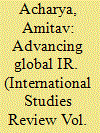

|
|
|
|
|
| Summary/Abstract |
This Presidential Issue, with contributions by scholars from Asia, Australia, the Middle East, South America, Africa, Europe, and the United States, illustrates how the idea of Global international relations (IR) could serve as a framework for both scholarly debate and empirical research and analysis. This issue is divided into two main parts. The first part contains nine feature articles that illustrate the multiple dimensions of a Global IR research agenda, overall demonstrating how bringing in non-Western ideas and agency broadens the horizons of existing IR knowledge. The topics covered here include Chinese conceptions of “relationality;” colonial interactions in the Indian Ocean to diffuse Westphalian sovereignty through processes of localization, comparing regionalisms, and norm dynamics in Asia and Europe; and the contribution of intercivilizational dialogues in bridging the West-Rest divide. Together, these articles challenge dominant understandings of these issues in current IR theory and highlight the place and agency of non-Western societies in the global order. The second part of the Presidential Issue, the Forum Section, contains ten short contributions that were drawn from two Presidential Theme Panels at the ISA 2015 Convention in New Orleans. These Forum essays not only highlight the obstacles facing the realization of Global IR, including some traditionalist objections to the whole idea, but also offer some pathways to overcome them. Overall, the Presidential Issue suggests that a Global IR is both possible and desirable.
|
|
|
|
|
|
|
|
|
|
|
|
|
|
|
|
| 2 |
ID:
145124
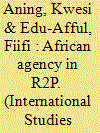

|
|
|
|
|
| Summary/Abstract |
Both the African Union (AU) and the Economic Community of West African States (ECOWAS) have been global leaders in embracing and operationalizing responsibility to protect (R2P). The adoption of the AU’s Constitutive Act, Article 4 (h) in 2000, has transformed its old-fashioned principle of noninterference to one of nonindifference. This authorizes the AU to intervene in Member States with respect to war crimes, genocide, ethnic cleansing, and crimes against humanity. ECOWAS has through its conflict prevention, management, and resolution protocol and its conflict prevention framework deepened and practicalized the notion of sovereignty as responsibility. These frameworks from both the AU and the ECOWAS have close similarities to the R2P norms. However, although these notions are captured in official documents, their actual operationalization faces challenges relating to sovereignty, limited institutional capacity, a restricted appetite for enforcement action, and a lack of explicit instruments to activate their intervention clauses in R2P-like situations. In spite of these challenges, the article argues that the initiatives of both the AU and the ECOWAS in Mali, Cote d’Ivoire, and Libya demonstrated a positively active African agency in contributing to global peace processes. This article, therefore, assesses the successes and limitations of African regional agency in enforcing R2P-like norms among its member states and its implications for and contributions to global international relations discourses.
|
|
|
|
|
|
|
|
|
|
|
|
|
|
|
|
| 3 |
ID:
145125
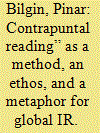

|
|
|
|
|
| Summary/Abstract |
How to approach Global International Relations (IR)? This is a question asked by students of IR who recognize the limits of our field while expressing their concern that those who strive for a Global IR have been less-than-clear about the “how to?” question. In this article, I point to Edward W. Said’s approach to “contrapuntal reading” as one way of approaching Global IR that embraces diversity and reflects multiple and overlapping experiences and perspectives of humankind. More specifically, I suggest that contrapuntal reading offers students of IR a method of studying world politics that focuses on our “intertwined and overlapping histories,” past and present; an ethos for approaching IR through raising the “contrapuntal awareness” of its students and offering an anchor for those who translate the findings of different perspectives; and a metaphor for thinking about Global IR as regional and global, one and many.
|
|
|
|
|
|
|
|
|
|
|
|
|
|
|
|
| 4 |
ID:
145121
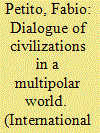

|
|
|
|
|
| Summary/Abstract |
In this article, I explore the relationship between the new multipolar trends related to the emerging powers and the idea of dialogue of civilizations. My starting point is to understand multipolarity as part of a broader epoch making process of transformation of contemporary international society beyond its Western-centric matrix. In the first part of this article, I therefore argue for an analytical understanding that emphasizes the emergence of a new multipolar world of civilizational politics and multiple modernities. In the second part of the article, I reflect on how to counter the risk inherent in the potential antagonistic logic of multipolarity by critically engaging the normative Huntingtonian construction of a multicivilizational-multipolar world order. I argue that the link between dialogue of civilizations and regionalism could represent a critical issue for the future of global peace. In particular, multiculturally constituted processes of regional integration are antidotes to the possible negative politicization of cultural differences on a global scale and can contribute to the emergence of a new cross-cultural jus gentium. These elements are critical to the construction of a realistic dialogue of civilizations in international relations while preventing the risks inherent in its growing multipolar configuration. They shape what, drawing on Amitav Acharya's work, could be named a multicivilizational-multiplex world order.
|
|
|
|
|
|
|
|
|
|
|
|
|
|
|
|
| 5 |
ID:
145119
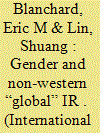

|
|
|
|
|
| Summary/Abstract |
Recent interest in Global international relations (IR) theory has prompted efforts to give voice to non-Western approaches to international politics, accentuating how cultures and their specific local problems contribute to distinct scholarly practices, and how this in turn challenges the hegemony of taken-for-granted, “universalized” Anglo-American IR theory. Encouraged by the overtures of Western academics, Chinese scholars have begun to articulate the role of “traditional” mindsets in Chinese thinking about world politics, proposing avenues toward the development of an IR theory “with Chinese characteristics.” Although these efforts are a laudable attempt to break through ethnocentrism, broaden the relevance of IR theory, and legitimate non-Western knowledge, we argue that the fact that gender seems to be entirely absent from the China-centered portion of this collaborative “West/non-West” project results in a partial and problematic approach: It fails to engage Chinese feminist theorizing by relying upon unexamined gendered concepts. This article uses the results of a series of interviews with mainland scholars to spotlight the challenges faced by existing Chinese IR feminists whose work is overlooked in mainstream Chinese IR’s holistic, Confucian approach to international society. We suggest ways gender sensitivity might inform debates about “Chinese IR” and how to improve Western efforts to engage non-Western IR more broadly.
|
|
|
|
|
|
|
|
|
|
|
|
|
|
|
|
| 6 |
ID:
145120
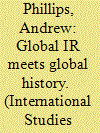

|
|
|
|
|
| Summary/Abstract |
International relations (IR) scholars commonly accept the sovereign state’s ubiquity today as the endpoint of a centuries-long process of modernization, spearheaded by European imperialism. Through this schema, European military superiority enabled Westerners to first impose themselves on non-European societies in the early modern period. The later spread of Western conceptions of national self-determination then compelled global convergence toward the sovereign state form after 1945. Conversely, I argue here that such accounts overstate the West’s margin of military superiority over non-Europeans throughout the age of empire. As a result, they also exaggerate European latitude in imposing their preferred institutional forms on conquered societies and mischaracterize the character of colonial modernity. Drawing inspiration from global history and harnessing illustrations from the Indian Ocean region, I argue that Western imperialism was critically mediated by Europeans’ alliances of convenience with indigenous partners. This dependence on local allies persisted throughout the colonial era as Western imperialists leveraged local institutions and conceptions of political legitimacy to perpetuate colonial rule. Acknowledging this reality forces us to critically revisit conventional narratives about the sovereign state system’s universalization, and to foreground hybridity over homogenization as global modernity’s master theme.
|
|
|
|
|
|
|
|
|
|
|
|
|
|
|
|
| 7 |
ID:
145123
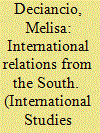

|
|
|
|
|
| Summary/Abstract |
Mainstream international relations (IR) has been built as an extension of imperial concerns. Thus, a restricted focus, even a self-styled demarcation was born: ĺetat ćest moi. This organizational boundary-setting left behind a good deal of the way the discipline evolved in other areas of the world. In this sense, Latin America has been caught between North–South and Western–non-Western traditions, emerging with questions, problems, and challenges different from those of European and North American scholars. Throughout history, Latin-American IR studies have been marginalized from Western mainstream IR approaches, being a theory adopter but not a theory exporter. However, Latin-American IR is not new. We can trace its roots to the nineteenth century when the processes of nation-building arose as a result of the end of the European occupations. Since then, an idea of region started to develop and, with it, several shared approaches to IR emerged. This article aims to bring the Latin-American IR agenda on regionalism into light both in terms of issues and traditions, challenging the conventional wisdom about the sources of IR theory and proving evidence that Latin-American scholars and policymakers made notable contributions that flourished on the edges of the mainstream.
|
|
|
|
|
|
|
|
|
|
|
|
|
|
|
|
| 8 |
ID:
145117
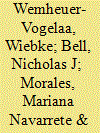

|
|
|
|
|
| Summary/Abstract |
This article presents findings from the 2014 Teaching, Research, and International Policy (TRIP) Project’s worldwide faculty survey that speak to recent claims in the Global International Relations (IR) Debate. The expansion of the 2014 TRIP faculty survey to thirty-two countries, including more than a dozen non-Western IR communities, enables an initial empirical assessment of some key questions raised by advocates and detractors of “Global IR.” This contribution describes and analyzes scholars’ own perceptions of the IR discipline and adds to the empirical literature on the Global IR Debate. In particular, we address three claims: that IR is a Western/American dominated discipline, that geography is the core dividing line in IR, and that there is a division of labor within IR wherein scholars in the West are responsible for theory production while the non-West supplies data and local expertise for theory testing. We believe that these findings shed light both on how the discipline came to be divided between dominant and marginalized discourses and in which areas this division is most embedded and/or ready to be dismantled.
|
|
|
|
|
|
|
|
|
|
|
|
|
|
|
|
| 9 |
ID:
145122


|
|
|
|
|
| Summary/Abstract |
The European Union (EU) and Association of Southeast Asian Nations (ASEAN) aspire to two different types of normative roles in their foreign relations, which reflect the different contexts and goals of their socialization frameworks. The EU, which can collectively count itself as a contemporary great power, seeks a normative role aiming to engage smaller players, often with serious domestic problems. By contrast, ASEAN—essentially a group of relatively weak states—is located in an area where its own security depends on the competition between great powers. Although the EU employs its normative power primarily to shape the political preferences of its neighboring small states and thus construct a normative hegemon in the European periphery, ASEAN’s normative influence is more concerned about intervention by the great powers of Asia. Although the EU model has dominated the discourse of normative power, the normative practice of ASEAN may be more relevant to the developing world facing great powers or a regional hegemon.
|
|
|
|
|
|
|
|
|
|
|
|
|
|
|
|
| 10 |
ID:
145118
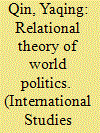

|
|
|
|
|
| Summary/Abstract |
Culture matters in social theory construction because the metaphysical component of the theoretical hard core is primarily shaped by the background knowledge of a cultural community. Individual rationality, a key concept abstracted from Western culture, constitutes the nucleus for much of mainstream Western International Relations Theory. This article proposes a relational theory of world politics with relationality as the metaphysical component of its theoretical hard core. It conceives the International Relations (IR) world as one composed of ongoing relations, assumes international actors as actors-in-relations, and takes processes defined in terms of relations in motion as ontologically significant. It puts forward the logic of relationality, arguing that actors base their actions on relations in the first place. It uses the Chinese zhongyong dialectics as its epistemological schema for understanding relationships in an increasingly complex world. This theoretical framework may enable us to see the IR world from a different perspective, reconceptualize key elements such as power and governance, and make a broader comparison of international systems for the enrichment of the Global IR project.
|
|
|
|
|
|
|
|
|
|
|
|
|
|
|
|
|
|
|
|
|